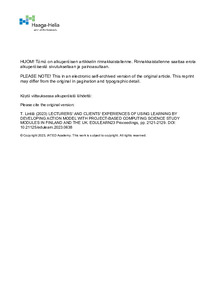LECTURERS' AND CLIENTS' EXPERIENCES OF USING LEARNING BY DEVELOPING ACTION MODEL WITH PROJECT-BASED COMPUTING SCIENCE STUDY MODULES IN FINLAND AND THE UK
Lintilä, Taina (2023)
Lintilä, Taina
IATED, International Association of Technology, Education and Development
2023
All rights reserved. This publication is copyrighted. You may download, display and print it for Your own personal use. Commercial use is prohibited.
Julkaisun pysyvä osoite on
https://urn.fi/URN:NBN:fi-fe2023071990793
https://urn.fi/URN:NBN:fi-fe2023071990793
Tiivistelmä
In higher education today, there is an increasing need for working life-oriented cooperation and appropriate learning and teaching methods. The working-life partnership gives higher education up-to-date information about what skills are needed in working life. Higher education curricula should include study contents derived from the needs of working life. Cooperation during studies with working life helps the development of students' competencies to meet the needs of working life. It prepares students to immediately get involved in working life and its development after graduation.
This article describes research in which the Learning by Developing (LbD) action model has been used as a teaching and learning method for computer science students in Finland and Great Britain. The study has been conducted as action research, and its research target has been Laurea University of Applied Sciences (Laurea) and Haaga-Helia University of Applied Sciences (Haaga-Helia) from Finland and Robert Gordon University (RGU) from the United Kingdom. The research aims to gain information about lecturers' and clients' experiences of the LbD pedagogy and its applicability to study modules containing an authentic client project. The lecturers were also asked how well the students' skills developed during the study module. The customers were asked how beneficial the project's result was for their organisation and whether it produced new insights into operational development. The research has been conducted as action research, and separate research cycles have been implemented in all three higher education institutions. Research data from lecturers and project clients have been collected through thematic interviews. Narrative analysis has been used in the study of the thematic interviews because the number of participants is limited.
This article describes research in which the Learning by Developing (LbD) action model has been used as a teaching and learning method for computer science students in Finland and Great Britain. The study has been conducted as action research, and its research target has been Laurea University of Applied Sciences (Laurea) and Haaga-Helia University of Applied Sciences (Haaga-Helia) from Finland and Robert Gordon University (RGU) from the United Kingdom. The research aims to gain information about lecturers' and clients' experiences of the LbD pedagogy and its applicability to study modules containing an authentic client project. The lecturers were also asked how well the students' skills developed during the study module. The customers were asked how beneficial the project's result was for their organisation and whether it produced new insights into operational development. The research has been conducted as action research, and separate research cycles have been implemented in all three higher education institutions. Research data from lecturers and project clients have been collected through thematic interviews. Narrative analysis has been used in the study of the thematic interviews because the number of participants is limited.
